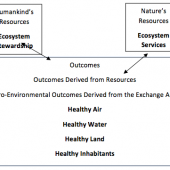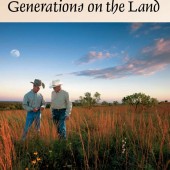
Abstract: In this paper we compare and contrast the Theory of Planned Behavior (Ajzen, 1985) with Social Exchange Theory (Homans, 1958) as conceptual foundations for eliciting pro-environmental behavior. We reason that Social Exchange Theory provides the better orientation because of its metaphorical power in casting humankind as being in a reciprocal relationship with nature rather than being in a superior position over nature. We illustrate our thinking by discussing ecosystem services (Melillo & Sala, 2008) as nature’s contribution to humankind in return for humankind’s responsible environmental stewardship.
Continue Reading
Richard Pritzlaff gives us a good idea what to expect, and not expect, from Nick Patoski’s book. This is not a grand theoretical or comprehensive work on land use or conservation, but, as Pritzlaff explains, stories from real families about their experiences of restoring land, especially grazing land. Pritzlaff gives us enough of a taste to sense the morsels that are here and to let us know how our plate will be filled by reading the whole book.
Continue Reading